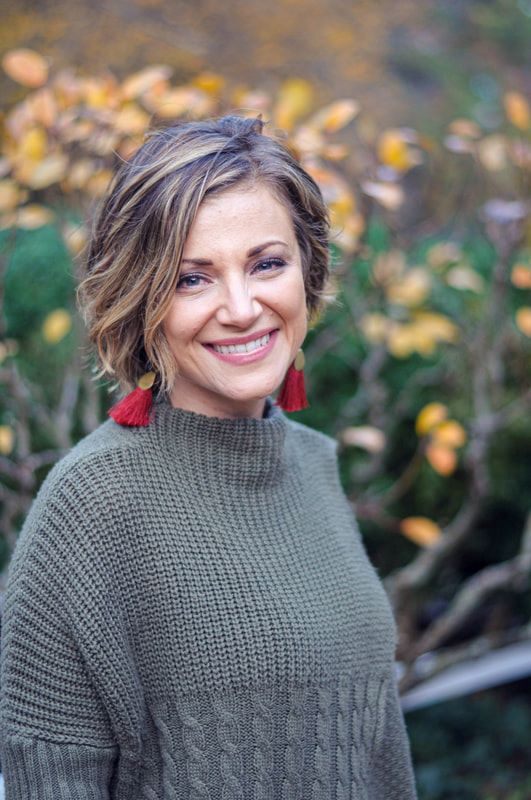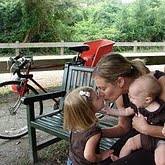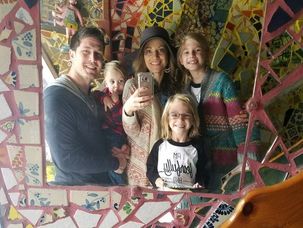 Family selfie in Philadelphia, a few days before learning I was pregnant.
Family selfie in Philadelphia, a few days before learning I was pregnant. Of course, a baby does represent a loss of sorts: of control, of time, of space for self, of body, of sleep, of the ability to order life. Even then, I knew it was infinitely more than that—a gift, despite the shock in its giving.
I thought I had processed all of this before Navarra came. But then, after two weeks of strong contractions, I labored in an L&D room at 39 weeks, looked at the incubator beside my bed and mused, “Daniel, can you believe there is going to be a baby in there? TODAY?” The discomfort on the nurses’ faces told me maybe I had a little more work to do.

I’m still thankful for the nurse who allowed me to labor on a ball in the shower for what must have been over an hour; when I went in it was dark, when I came out the sun was up and I was sure it was time to push. But it wasn’t. I’m still embarrassed and thankful that a dedicated nurse knelt in front me—even by the toilet— while I labored, ensuring the monitor stayed in place so that I could have the birth I had prayed for.
I’m still in awe of the midwife whom I had only seen once the entire pregnancy, the one I loved who had delivered Deacon, our miracle baby, who had stayed home until just the right time and brought hope and peace and calm to my room and delivery—again.
I still well up every time I think about that moment when I yelled at my patient doula that I couldn’t do it, how she looked deep into my eyes with the knowledge that my feeling that I couldn’t meant that I already was.
I’m still teary thinking about the circle of women that closed around me at 8:16 when I said, “I need to push, and I can’t stop;” how they deftly moved into place, how my moans became primal screams, how they deposited a tiny, wailing baby on my lap at 8:17. How I shook and shook and cried in disbelief. I had done it, one last time.
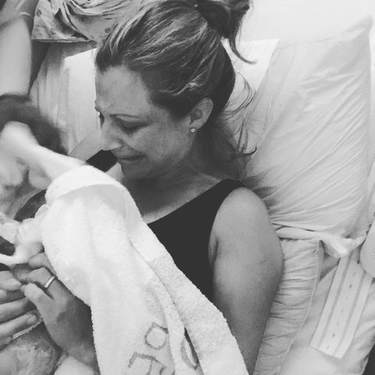
I held that baby to my breast and she nursed instantly, like we had done it a thousand times already, and somehow it felt like we had.
Since Navarra’s birth, there has been a calm I can’t explain that exists somewhere above the swirl of chaos in the everyday. When her excited siblings and my parents descended upon our room and my bed, it all felt like it was falling into place; our older children falling in love instantly, just like we had. We came home not much more than 24 hours after her birth to a house filled with flowers and food and love by family and the best of friends. My generous parents took our big kids to their house for the weekend, and we ate and rested and stared at our last baby in our quiet house. The big three returned a few days later, anxious to get to know their sister. They still are—we all are. We welcomed a steady stream of company for the first two months of her life and Daniel was able to spend the better part of a month home with us. It’s not an exaggeration that this fourth baby has propelled him into super dad and husband status as far as we are all concerned.

Our sweet-tempered babe has been here almost four months to the day now, and sometimes it feels like she always has been. Those bright, almond-shaped baby blues that all our babies seem to have; it feels like I’ve looked into them four separate times now. They watch me every day, all day, as we are still practically inseparable, but it doesn’t feel endless like maybe it had with previous babies.
I still felt that almost suffocating fear and creeping darkness after the unmistakable high of the first few days wore off—was she still breathing? Was I? But I felt aware of the waves it all came in. Whereas contractions had felt like waves I needed to ride on top of and then fall from, the lows of hormones after felt like waves that washed over me; I had to duck under them and hold my breath until they passed me by, and pass me by they did.
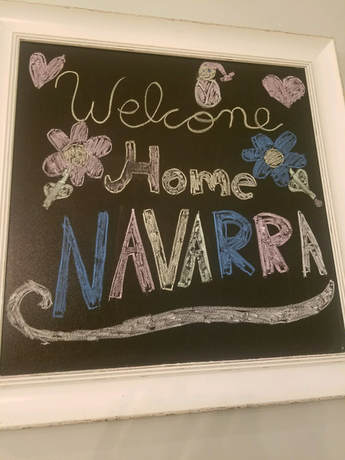
Navigating life with an infant and a tween and two in between has made me cry almost daily. Because it feels like that poised, brilliant almost-ten-year-old was just here in my arms. But she wasn’t, and now she’s calling bye to me over her shoulder on Halloween night, running off with a friend’s family without even a second look.
It’s so fast and hard and beautiful and sacred. All of it. But the weight of it this time somehow makes me free. Three mornings per week, I drop Deacon off at preschool. Before Navarra came, I would rush out, eager to make the most of my childless time. In this season, there is no childless time, but it doesn’t feel as oppressing as I had dreamed it would, as it did before. School starts at 9:30, and lately that’s been when Navarra demands second breakfast. She is not shy about it. So, I kiss Deacon good-bye and settle in on the couch in the church lobby to nurse my sweet, smiley last baby. I don’t often leave the church before 10. Navarra reminds me that, in this stage of life, there is no point in hurrying, I’ll only miss it. I used to wonder what the larger point of all of this was, and in this time she reminds me, being present is the entire point.
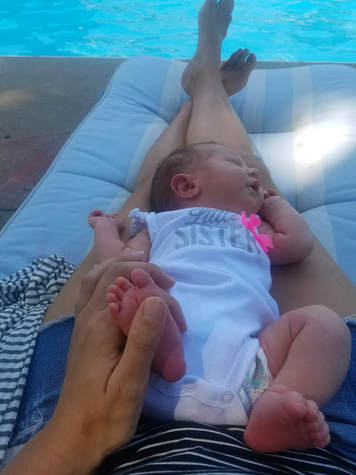
So much of motherhood across all the seasons our children are currently in is exactly this: just being here. To listen, to respond. Not to keep the dangers and troubles at bay, because of course we’ve realized by now that we don’t have that kind of power. This baby has represented exactly what I feared she would: a total loss of control, and for that I could not be more grateful. She is a gorgeous, tangible reminder that I can’t control the whethers and whens: of sleep or tears, of the kindness of others, of sickness or loss, of dreams and their passing, of all of those 10,000 little good-byes as we prepare our babies to launch.
I can’t control any of it. But I have the enormous privilege of being here for it, even when they start to flap their fledgling wings and roll their eyes and threaten to leave us behind. And when the trouble comes, I can show them how to weather it; I can point them to the One I run to in times of chaos and struggle. I can stay close and show them how to breathe.
 RSS Feed
RSS Feed
